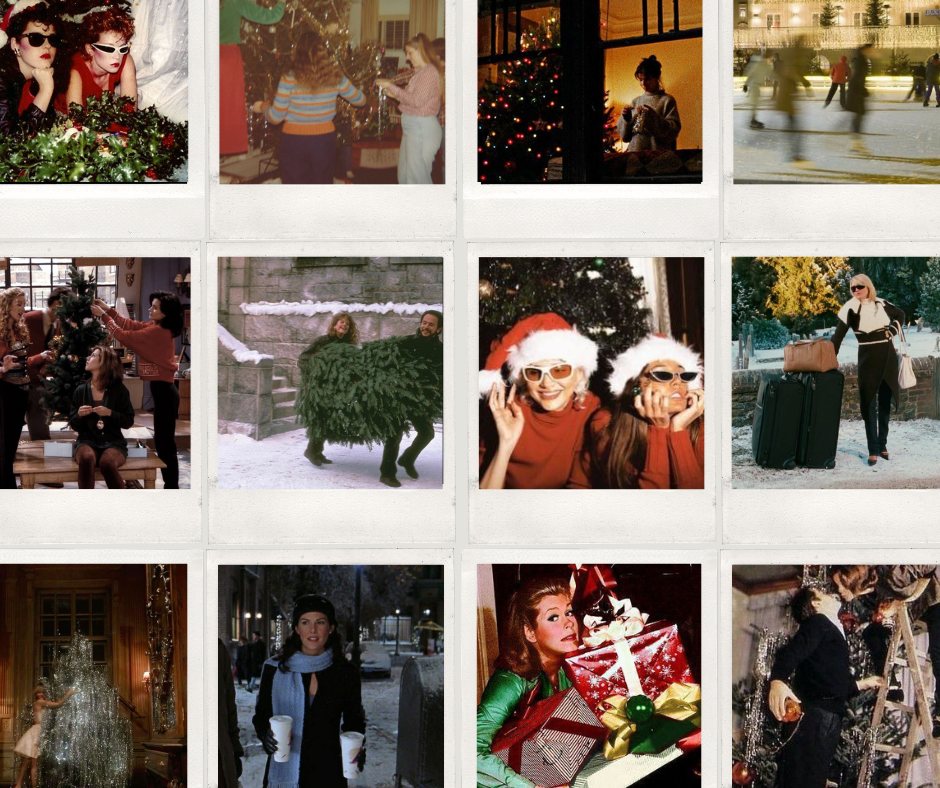
Introduction
Even under the best of circumstances, the holidays can be difficult. From robust social calendars and holiday travel to sourcing your own gift guides and getting together with family that you may, or may not, want to spend the month of December with, it’s stressful at best and catastrophic at worst when it comes to your mental health…. And your wallet. While many look forward to the lights, festivities, and gifts, 84% of people report feeling moderate to overwhelming holiday stress and the relapse rates for drugs and alcohol skyrocket, increasing by 150% during the holiday season. This guide will walk you through practical, compassionate strategies to navigate emotional wellness and reclaim your peace during the most wonderful—and sometimes most stressful—time of the year.

Understanding Holiday Mental Health Triggers
Understanding holiday mental health triggers is the game the reindeer didn’t let Rudolph play that year… but you can. But don’t worry, at From The Blu, any of you can play with us! Some common holiday triggers include:
- Being overextended. While December is one of the longest months of the year, the days are the shortest and the season seems to fly by. Where your normal routine once served as the bedrock of your days, this time of years turns it into an icy slip-and-slide beneath you. It can be nearly impossible to preserve your routine when kids are out of school early, every post on instagram seems to be welcoming a new engagement or baby into our midst, and each weekend is pumped full of cookie-decorating parts, company christmas parties and holiday shopping. If you don’t buy the ham and the perfect doll and the cutest wrapping paper, who will? If you don’t attend each party, soiree and bonfire, what will you miss?
- Grief. They say that grief is just love in a heavy coat, and it certainly keeps you warm in this time of year. Whether you lost your loved one during this season or on a beautiful summer day, the wound rips open with each holiday you spend without them. Not only do you grieve loved ones who have passed, but you can also grieve people and things who are very much alive. Family estrangement is especially difficult during the holiday season as is grieving the seasons of life. Sometimes, we wish we could go back to who we were yesterday, and December does not make this feeling go easy on us.
- Loneliness. It’s hard enough when our family tree branches out like the National Lampoon Christmas Vacation tree… a little full, but a lot of sap… but what about when our tree has dwindled to a branch? When our village as been carved into a husk of what it once was? Loneliness shows up for us in a million painful, daunting ways in the holiday season that requires both a high level of stability and a high level of confidence. It is hard, and at times, even embarrassing to show up to family Christmas where you still have to sit at the kiddie table, or the company Christmas party where you don’t check the box beside plus one.
- Financial expectations. With each passing year, it seems like the lines of santa’s pockets thin but the lists get longer. You’ll be pressured to get presents for immediate and extended family, friends, coworkers, the family dog… you name it. Not to mention the countless opportunities to spend more money at get-togethers and gift swaps — dirty santa, secret santa, etc…. Does Santa have any more alteregos we don’t know about? I guess we’ll find out this year!
- Substance abuse. It is no secret that American society has decided any and all holidays are an excuse to party a little hard… I mean, we get hammered for Saint Patrick’s Day and most of us aren’t even Irish. During the holidays, alcohol and other substances are everywhere you look, from shop window displays to parties to even commercials… I hate to break it to you, but the delicious mugs of foamy goodness that Budweiser likes to brag about every December are just cups of dish soap, folks.

Practical Self-Care Strategies for Emotional Resilience
- Build your coping skills tool box. Coping skills aren’t a one-size-fits-all… in fact, nearly nothing is, especially not when it comes to mental health. Coping skills can look however you want it to look. Before I became a substance abuse counselor, my would-be director asked me how I take care of myself when things get too hard. My answer? Sometimes, I just do nothing. I don’t take long walks on the beach or listen to Elliot Smith. I go to bed. I make my day end because it needs to. This is a viable option that may be crucial for your survival of the holiday season — especially in addition to classic coping skills. Some include journaling, meditating, listening to music, going for a walk, and spending time with friends. Check out one of my favorite journals here and my holiday playlist here
- Develop a strategy for setting healthy boundaries. This is the part where I put on my therapist cap and tell you to role play! Setting boundaries is hard, even for the professionals. If you need to, come up with a go-to statement for when you need to set a boundary. Have to wrap christmas presents? Have to clean the house before a party or a playdate? Have preexisting plans with mom/dad/sister/neighbor/golfish? All valid ways to protect your own time. Not only this, but a simple “no, thanks!” is always a complete sentence. Sometimes, you just… can’t. And that’s okay. The people you love – and who love you! – don’t have to understand. That doesn’t mean it’s not valid. Here’s an easy how-to on setting boundaries.
- Self care isn’t optional. Out of all the things you “must” do in your busy day, taking care of yourself is one of them. There are so many ways to carve out time to take care of yourself. It doesn’t have to be lengthy or glamorous, it can be as simple as five to ten minutes. Don’t cancel your personal appointments if you can help it. Get your nails done, or your hair. Go to therapy, whatever you’re waiting for will wait for you, too. Nora Roberts once shared her theory about glass and plastic balls. Some balls are plastic, if you drop them, they’ll bounce right back to you. Those things can be delayed. But some are glass, if you drop them, they shatter. They must be prioritized. Learn to tell the difference! Check out the Headspace app for some quick daily meditations or Better Help for some therapy that you can take anywhere. Your “you time” can also take place while you complete some of your necessary tasks – check out a fun podcast or an audiobook!

Managing Family Dynamics and Social Expectations
- You can love family. It’s okay if you don’t like them. Family dynamics are always challenging. Navigating them can be even more so. Knowing out to set boundaries with those closest to you is key. Take time when you need it, assert yourself when you need it, and choose your battles… when you need to. Protecting your peace is always an option. It’s not a cop-out or weak to protect your peace over being perceived as “right.” Don’t forget, you could be the ripest, juiciest peach in the world… and you’re still going to find someone who doesn’t like peaches. This, and a 5×7 mind can’t imagine an 8×10 dream. It doesn’t mean you, or your dreams, or your life, need to be smaller. They just need a bigger frame.
- You can’t pour from an empty cup. It’s a corny adage, but it’s true. Not only can you not be solely responsible for filling the cups around you, but if you never fill your own, it will erode. If you run your engine dry repeatedly while trying to provide for others, a hole will wear in the bottom of your cup. You can pour and pour but never feel full. This is the point of self care and prioritizing wellness. It’s not selfish, it’s necessary. Noah Kahan was wrong, although we love him, you shouldn’t drive on empty just because your engine let’s you think you can.
- Coping skills are as essential as water, food and shelter. Maslow’s hierarchy of needs was missing something crucial on that bottom level… coping skills. You can’t live without them. Use your journal, your meditation, your dance-it-out moments, your quiet time. You need them. Most importantly, you deserve them. Don’t treat them as optional.

Financial Wellness and Holiday Stress Reduction
- Be realistic. You don’t need to participate in every gift exchange. Prioritize. Do you want to participate? Will it be fun, or with your time, money and effort? If you wouldn’t expect someone else to give beyond their means, why should you?
- Be homemade. There were years where the only gifts I gave were homemade as I was cutting costs. More than this, there were years when homemade gifts were the only ones I wanted to receive! Homemade can be a fun and even relaxing alternative to acting like an extra from Confessions of a Shopaholic. Your thought and kindness are more valuable than a dollar ever will be.
- Be responsible. Set a budget and stick to it. When it comes down to it, numbers don’t lie. Only you know what you can spend. Devise a budget and hold it firmly — there is no need to overextend. Afterall, that’s not what the holidays are for.

Maintaining Mental Health Routines During the Holidays
- Take care of your vessel. An engine can’t run without oil – your body can’t run without fuel. Eat well, sleep well, and give yourself time to step outside.
- Sleep hygiene is real. How, when and where you sleep is absolutely crucial to your overall health and wellness. In the holiday season, we go to sleep late and wake up early, meaning our sleep schedule is the first thing to go. This year, don’t let it be.
- Therapy is not optional. If you are someone who goes to therapy regularly, now is not the time for a break. Your mind might whisper you sweet-nothings of “we don’t need this, we feel better!” but this is why you need it now more than ever. If you feel better, good, it’s working – keep going! If you don’t feel better, then you still need it, all the same.
Conclusion
We spend every holiday season wishing for a perfect one — either in the blurry past or the distant future. It’s joyful and blue and everything in between and you need to take care of yourself. Afterall, even Santa gets cookies at the end of the day.

